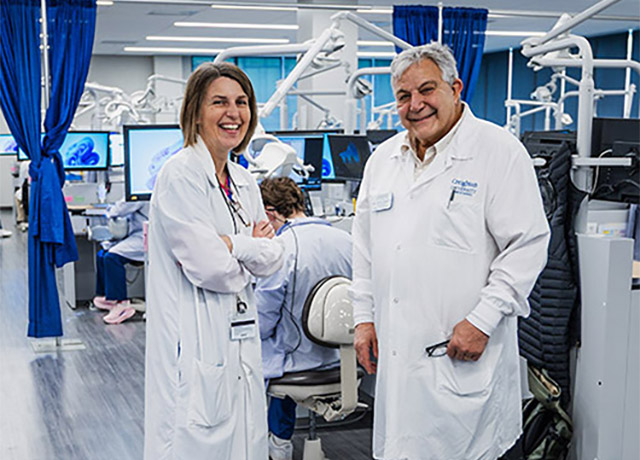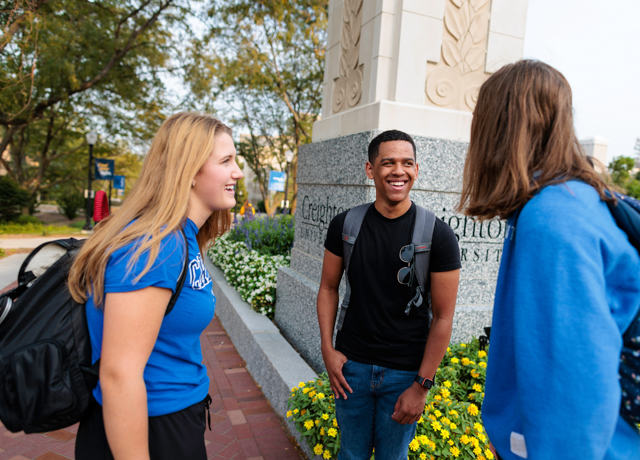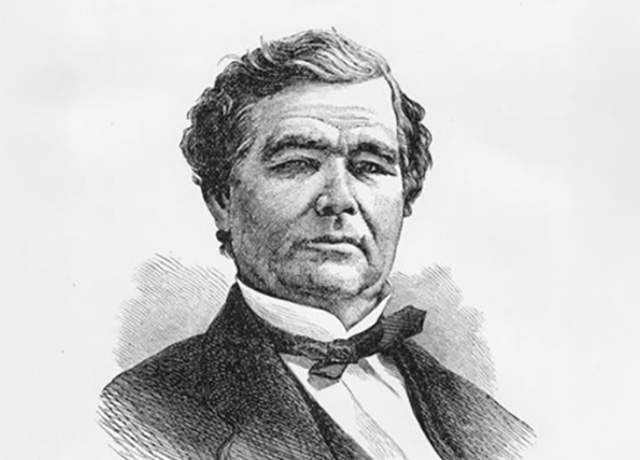Featured Testimonial About Creighton University
I’ve grown and changed quite a bit since I’ve been here, and I’m thankful for that. Being a Creighton student has given me the opportunity to pursue my passions, think critically about them, and explore them in an interdisciplinary way.

Through their generous support, Randolph Ferlic, BS’58, MD’61, and Teresa Kolars Ferlic, help foster the talents and curiosities of students like Ferlic Research Fellows Caroline Adrian, Joseph Frank and Harsh Uppala.
Ferlic Fellowships are one way the University’s Center for Undergraduate Research and Scholarship (CURAS) ensures every student who wants to take a greater hand in exploring an academic interest has a chance to pursue their passions with the guidance of faculty.
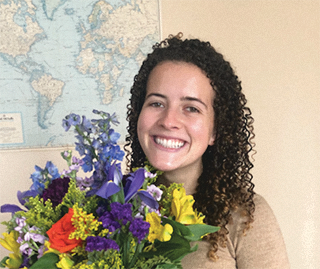
CAROLINE ADRIAN
Class of 2021
Hometown: Fort Collins, Colorado
Major: Environmental Science
Project: “When Wells Rise: a Multidisciplinary Analysis of Extreme Weather Events in the Nebraska Sandhills”
What outcome from your experience as a Ferlic Research Fellow are you most proud of?
I am proud that we were able to remain true to the original intentions of my project—looking at the Sandhills through a quantitative and qualitative lens—despite everything. My goal has always been to represent the experiences and perspective of our participants accurately, and I am humbled to have been able to work under hardworking, upstanding mentors who similarly place value on representing the truth.
Where does your interest in Environment Science come from?
I was very fortunate to have grown up in the Mountain West, and also that my family has roots in ranching in Western South Dakota. It is fair to say that I was outside a lot! From an early age, I recognized how vulnerable humans are in relation to the natural world, but also how big and vast and beautiful this earth is. There’s this quote by Antoine Saint-Exupery that asserts that, in order for people to take action out of their own volition, they must be dedicated to that thing with love. Environmental Science is a way for me to engage in that greater love for the outdoors.
What have you enjoyed most about your research?
Researching has been a dream and I couldn’t have imagined a better team and support system. I am so grateful for Dr. Ferlic’s support and for the mentorship by Dr. Mary Ann Vinton and Dr. Jay Leighter. They have challenged me and I have felt a significant growth in myself that I truly appreciate.
How has the opportunity to present your work impacted your learning experience?
It’s interesting how you can present your work while continuing your research, so each progressive presentation will look a little different than the last. I appreciate the learning and growth that comes from the cycle of preparation, presenting and researching.
Did anything surprise you?
Engaging in field research in the current circumstances has challenged me to be flexible and open to approaching a question or problem in a new way. I’ve been surprised how much we have been able to do with a bit of creative problem solving.
What are your plans after graduation?
I plan on getting my Master’s in education and teaching elementary school. I love ecology and I love people, so I hope that I can be an advocate for both—wherever that takes me.
Are you ready for your next steps?
Creighton has definitely prepared me. I’ve grown and changed quite a bit since I’ve been here, and I’m thankful for that. Being a Creighton student has given me the opportunity to pursue my passions, think critically about them, and explore them in an interdisciplinary way. Although I don’t feel ready to graduate, I probably will be come May.
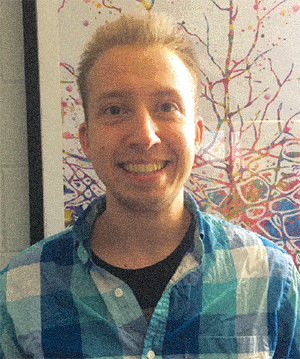
JOSEPH FRANK
Class of 2021
Hometown: Waukee, Iowa
Major: Neuroscience
Project: “Identification of Small Molecule Pou4f3 Agonists for Mammalian Cochlear Hair Cell Regeneration”
What drew you to Neuroscience at Creighton University?
I have always been intrigued by the human brain: how it develops, its complexity, and its role in making us human. I have always wanted to study science, and I thought that neuroscience would be a nice challenge. My interest in scientific research brought me to Creighton University, where undergraduate research opportunities are broadly available.
What is the focus of your research?
According to the WHO, over 466 million people worldwide suffer from hearing loss. At present, there are no FDA approved biological therapies for the regeneration of hair cells in humans, so it is imperative that regenerative therapies be developed. My work focuses on identifying compounds to act as therapeutics for the regeneration of cochlear hair cells, the cells responsible for our hearing.
What have you enjoyed most?
I appreciate the full investment that research faculty have taken in me and my project. At each step, I have felt they truly cared about me as a person and about my work. First and foremost, the faculty trained me and my fellow students in the lab to be good scientists, ones that could succeed in any field. I believe that my mentor, Dr. Jian Zuo, helped me unlock my full potential.
How has the opportunity to present your work impacted your college experience?
Although it’s both exciting and nerve-racking, presenting my work has instilled both pride and inspiration within me. It is inspiring to be trusted with communicating results and proudly defending my lab’s work among professionals.
What’s next for you?
I am planning on pursuing a PhD. The programs I am applying to fall under the umbrella of regenerative medicine, biomedical sciences, and developmental biology. Graduate studies will give me a powerful foundation on which I can build my scientific career and contribute to the cutting-edge translational science that improves all human lives.
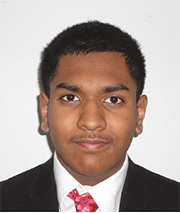
HARSH UPPALA
Class of 2021
Hometown: Omaha, Neb.
Major: Physics and Biology
Project: “Implementing Glucose-Derived Carbon Dots in Nanocrystalline Injection Solar Cells”
How did you become interested in physics and biology?
I had teachers in high school who really made physics interesting for me. I also had a fantastic computer science teacher. I love programming, so I couldn't decide which route to go. Upon realizing that college physics involves a lot of experimental design, and by consequence programming, I jumped to physics. I was drawn to Creighton and the physics department because of the potential for research opportunities.
What role did your faculty mentor at Creighton have in your research?
Dr. Sidebottom has given me a holistic understanding of research. Not only has he shown me the good things--like publishing papers, analyzing data, and trying proven experiments, but also the difficult things--like overcoming frustration, trying new methodologies, and searching wherever I can for answers. Never once has he make me feel that my questions were unimportant, irrelevant, or uninformed to answer. He doesn't have the answer to every question, but he goes above and beyond to encourage a healthy discussion of the subject matter. Dr. Sidebottom is one of the most caring, most compassionate teachers I've ever had the honor of taking classes from and working with.
What is the focus of your project?
If you caramelize any sugar in a pot, the caramelized sugar will glow under UV light. We think the glowing is due to carbon dots. Carbon dots are cheap, easy to make, and have a wide variety of uses. Characterizing them is very difficult, but applying them to other things is relatively easy. We tried applying them to solar cells. Our paper on the process of integrating them into solar cells is under review and we hope to publish on the isolation procedure. The possibilities are endless--cheap, easy to produce fluorophores have many other applications, such as being able to be used in the testing of heavy metals, in drug delivery, or in enzyme catalysis.
Do you have a significant takeaway from your experience?
Experiments don't work all the time, and that's okay. The answer is usually to keep searching or to ask a question in a different way. I have been working on this project for close to three years. I collaborate and confer with experts that have one hundred years of combined experience in the very narrow field in which we do research. I read research articles from the likes of journals such as Nature and ACS. No one person or article has ever consistently had the perfect answer to help me solve a problem. I think our research is uniquely prone to this, but from what I understand, this is a universal experience with research.
How have you developed over the last three years?
I have a greater appreciation for careful planning and collaboration. I've grown to be able to work well in a team, but I've also learned how to work well by myself.
What are your plans for the future?
I haven't picked a profession, yet. I am thankful for the opportunity to do research at Creighton and I still want to know more. I plan to go to graduate school and I feel that I have a sufficient research background to succeed. I know that I have so much more to learn.
